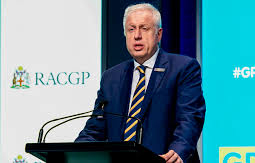The RACGP has changed political tack in a pragmatic campaign aimed at alerting our politicians to the danger of ignoring a 'sleeping lobby giant'
RACGP president Dr Harry Nespolon caused quite a stir last week by asking GPs to lobby their patients individually, in surgery even, during the upcoming election campaign.
Reaction on social media website GPs Down Under (GPDU) and trade media websites had many GPs questioning whether they should be using valuable time with their patients for politics rather than medicine.
But if you talk to Dr Nespolon about what he is trying to do, you sense that we might be all missing a trick.
Dr Nespolon told TMR recently that his time is relatively short as president, and that while the RACGP was kicking goals on many fronts in terms of its traditional roles in education, training and research, the issue of GP remuneration was too important to the future of the profession not to make it very high on his agenda.
And given how political GP remuneration has been, he and the RACGP needed to be more savvy politically. He cited the pharmacy and pathology lobbies as succeeding where GP lobbying had failed in the past, and he saw it as a key objective to change that, albeit in different ways to those lobby groups.
If you think about the announcement by Dr Nespolon on video last week asking GPs to take the political fight into the surgery, it might be an announcement equally, or even more so, directed at the government and opposition, than GPs themselves.
If you wanted to send a warning shot across the bow of both sides of government that GPs were prepared to start wielding their very real power base in a manner like the pharmacists and pathologists have done in the past, can you think of a better way?
GPs have been the quiet achievers in our healthcare system, resisting the temptation to get down and dirty, like the pharmacists have been doing for years.
Dr Nespolon’s has been visiting both sides of politics in Canberra a lot lately.
Nothing different there from the norm in the run up to a federal election, looking from the outside. But Dr Nespolon’s video last week, broadcast directly to all GPs so soon after him visiting Canberra, punctuates the seriousness of his intent that he would have been spruiking during those visits.
His intent is to change the political ground-rules that Canberra has been used to with the GP lobby.
Today’s announcement by the federal opposition that they will end the indexation freeze on the remaining MBS items for GPs by July this year, a year earlier than the government’s current timetable, comes just three days after Dr Nespolon posted that video. And we’ve already seen a furious response to that from Federal Health Minister Greg Hunt.
General practice is in the media spotlight, and very early on in the campaign. Is that coincidence? Or are the politicians already responding to last week’s jostling by Dr Nespolon?
The ALP announcement was naturally welcomed by the RACGP, but only as a start to much more significant remediation which is needed.
“Labor’s federal election promise to completely end the Medicare rebate freeze is welcome. But without catch-up funding to reset Medicare rebates, patients will still be paying more than ever for their healthcare. A federal government must undo the damage the Medicare rebate freeze has had on GPs and our patients,” said Dr Nespolon in a media release.
“Australian GPs and their patients need the government elected at this year’s federal election to commit to bringing general consultation items to where they would be today, had it not been for the lost indexation caused by the Medicare rebate freeze,” he said.
The RACGP has traditionally been a governance and training organisation first and foremost. Dr Nespolon appreciates that part of his role, but he is very clear that the time for being “nice” politically over remuneration is over.
The RACGP is set to release a media campaign across TV, radio and social media in the lead up to the election, targeting the effect that GP remuneration issues has on patients.
This has been another point of contention with GPs, with some complaining that they didn’t see the point of the “Specialist in Life” campaign, and wondering what it cost. Others wanted to see some evidence of success.
But Dr Nespolon told TMR that the success of the campaign was in lifting awareness, not just with the public, but importantly with politicians, about the pivotal role of GPs in the community.
“We need more visibility, especially with the politicians. If we didn’t have any money, I’d spend what we had on the biggest poster ever seen at Canberra airport,” he said.
The RACGP does have money, and an intent to spend it in the lead up to the election.
The government has indicated that it has election funding promises coming for healthcare in the federal election to the tune of $500 million. But how much of that will be for GPs and how much for hospitals, research and pathology?
Dr Nespolon isn’t going to die wondering.
He’s happy to ruffle feathers in his remuneration crusade. Even if it sometimes ends up being those of his own flock.


